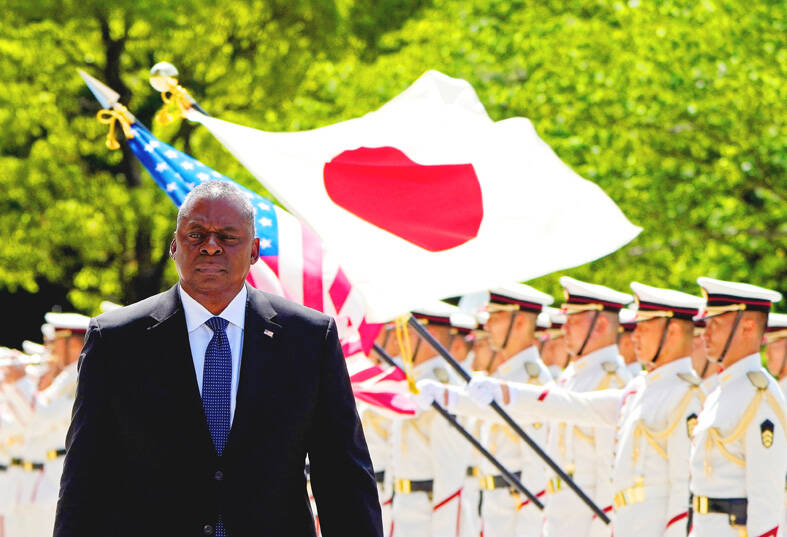Japan and the US are set this week to agree to jointly develop an interceptor missile to counter hypersonic warheads being developed by China, Russia and North Korea, Japan’s Yomiuri Shimbun reported yesterday.
The agreement on interceptors to target weapons designed to evade existing ballistic missile defenses is expected when US President Joe Biden meets Japanese Prime Minister Fumio Kishida in the US on Friday, the report said, without giving any source for the information.
Officials at the Japanese Ministry of Foreign Affairs could not be reached for comment outside business hours.

Photo: Reuters
Unlike typical ballistic warheads, which fly on predictable trajectories as they fall from space to their targets, hypersonic projectiles can change course, making them more difficult to target.
Biden and Kishida are to meet the sidelines of a trilateral summit with South Korean President Yoon Suk-yeol at the presidential retreat at Camp David, Maryland, the Yomiuri said.
Washington and Tokyo in January agreed to consider developing the interceptor at a meeting of US Secretary of State Antony Blinken and US Secretary of Defense Lloyd Austin with Japanese Minister of Foreign Affairs Yoshimasa Hayashi and Japanese Minister of Defense Yasukazu Hamada.
An agreement would be the second such collaboration in missile defense technology.
Japan and the US developed a longer-range missile designed to hit warheads in space, which Japan is deploying on warships in the sea between Japan and the Korean peninsula to guard against North Korean missiles strikes.

NEXT GENERATION: The four plants in the Central Taiwan Science Park, designated Fab 25, would consist of four 1.4-nanometer wafer manufacturing plants, TSMC said Taiwan Semiconductor Manufacturing Co (TSMC, 台積電) plans to begin construction of four new plants later this year, with the aim to officially launch production of 2-nanometer semiconductor wafers by late 2028, Central Taiwan Science Park Bureau director-general Hsu Maw-shin (許茂新) said. Hsu made the announcement at an event on Friday evening celebrating the Central Taiwan Science Park’s 22nd anniversary. The second phase of the park’s expansion would commence with the initial construction of water detention ponds and other structures aimed at soil and water conservation, Hsu said. TSMC has officially leased the land, with the Central Taiwan Science Park having handed over the

The Philippines is working behind the scenes to enhance its defensive cooperation with Taiwan, the Washington Post said in a report published on Monday. “It would be hiding from the obvious to say that Taiwan’s security will not affect us,” Philippine Secretary of National Defense Gilbert Teodoro Jr told the paper in an interview on Thursday last week. Although there has been no formal change to the Philippines’ diplomatic stance on recognizing Taiwan, Manila is increasingly concerned about Chinese encroachment in the South China Sea, the report said. The number of Chinese vessels in the seas around the Philippines, as well as Chinese

AUKUS: The Australian Ambassador to the US said his country is working with the Pentagon and he is confident that submarine issues will be resolved Australian Ambassador to the US Kevin Rudd on Friday said that if Taiwan were to fall to China’s occupation, it would unleash China’s military capacities and capabilities more broadly. He also said his country is working with the Pentagon on the US Department of Defense’s review of the AUKUS submarine project and is confident that all issues raised will be resolved. Rudd, who served as Australian prime minister from 2007 to 2010 and for three months in 2013, made the remarks at the Aspen Security Forum in Colorado and stressed the longstanding US-Australia alliance and his close relationship with the US Undersecretary

‘WORLD WAR III’: Republican Representative Marjorie Taylor Greene said the aid would inflame tensions, but her amendment was rejected 421 votes against six The US House of Representatives on Friday passed the Department of Defense Appropriations Act for fiscal 2026, which includes US$500 million for Taiwan. The bill, which totals US$831.5 billion in discretionary spending, passed in a 221-209 vote. According to the bill, the funds for Taiwan would be administered by the US Defense Security Cooperation Agency and would remain available through Sept. 30, 2027, for the Taiwan Security Cooperation Initiative. The legislation authorizes the US Secretary of Defense, with the agreement of the US Secretary of State, to use the funds to assist Taiwan in procuring defense articles and services, and military training. Republican Representative